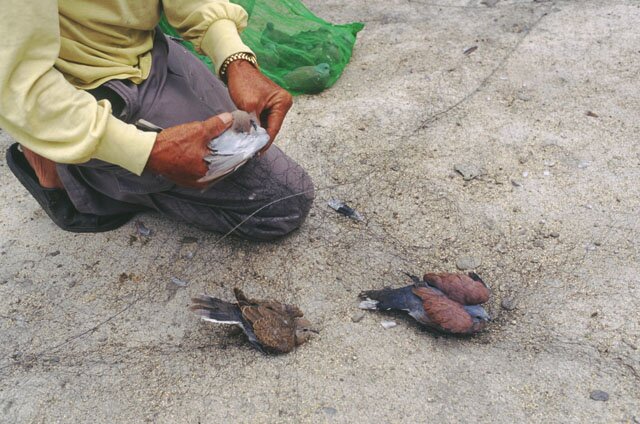BROWSE COUNTRIES/ TERRITORIES
Liem Sioe Liong: Bringer of strife
The founder of Indonesia's Salim Group has set his eyes on another empire — this time in India.
In Chinese, his name means “the bringer of kindness”. But Liem Sioe Liong, a 92-year-old billionaire who left China nearly 70 years ago to seek his fortune, has brought little more than strife and unrest to his two host countries, Indonesia and India.
In early January farmers and protestors in the Indian state of West Bengal clashed with police to prevent the acquisition of farmland in Nandigram, a sleepy riverside region 150km from Kolkata (Calcutta), the state capital. Some hired goons opened fire on the crowd and a dozen died. In reaction, protests and riots sprang up all over West Bengal. Buses were burnt, schools closed and traffic ground to a halt. Nearly 1,000 were arrested, but the rioting went on. It stopped only after Buddhadeb Bhattacharya, the Chief Minister of West Bengal, symbolically tore up the acquisition notice and put a three-month stop to all land acquisition.
Liem, though not physically present, was in the eye of the maelstrom. In July 2006, his Salim Group signed an agreement with Bhattacharya for what is called the biggest FDI, or foreign direct investment, deal in the history of India. Salim will invest some US$4.2 billion in West Bengal to build a chemical hub in a special economic zone, a large and a few small townships, a 100-km-long, 100-m-wide super highway and other projects. In return, the Bhattacharya administration would give them close to 40,000 acres of land, most to be acquired from farmers and other landowners.
The chemical hub is to be built in Nandigram, across the Haldi River from the industrial city of Haldia. Salim requires some 15,000 acres of land, which will be taken from 29 mouzas (villages). It was the acquisition of land in Nandigram that sparked the bloodshed.
West Bengal, ironically, is ruled by the Communist Party of India. But Bhattacharya, who succeeded his mentor Jyoti Basu in November 2000, is keen to open the dirt-poor state to investors. His embrace of big business — one of the tycoons is Ratan Tata who agreed to build a large car plant there — has upset many of his left wing allies. It also turned land acquisition into the hottest political potato in the Bengali parliament.
The Salim incident gave the opposition the perfect foil to attack Bhattacharya. They have the backing of the farmers and small landowners, people Bhattacharya is supposed to represent but who are increasingly voting against him. Bhattacharya’s enemies claim the West Bengal government is forcibly taking productive farmland — which yields two or more crops a year — from the farmers and giving very little in return. They now proclaim the Salim project is dead.
Speaking against them, the lone voice on the side of Salim, is Prasun Mukherjee, Salim’s partner in the West Bengal projects, who insists everything is “very much on”. Mukherjee is the protégé of Bhattacharya, the former police commissioner of Kolkata. He also handles money matters for the Chief Minister, in a relationship similar to that between Liem and ousted Indonesian President Suharto from the 1950s to perhaps even today. When asked to comment on Mukherjee’s remarks, Bhattacharya kept a stonily silence.
Opposition apart, everyone agrees West Bengal needs drastic economic reforms. After three decades of rule under Stalinist ideology, most big businesses had relocated elsewhere. Economically, West Bengal was in dire straits and Kolkata a “dying city” (in the words of the late Rajiv Gandhi, one time Prime Minister) when Bhattacharya came to power. Bhattacharya has done a superb job in enticing capital to his state, which under his reign has the second highest growth rate in the entire India.
But he may have bet on the wrong horse. Salim, or Liem Sioe Liong, born in China in 1915, went to Indonesia in 1938. He left, in fact though not in name, in 1998 after a country-wide riot that ousted Suharto. In the 60 years he had amassed a fortune of at least US$15 billion, but put very little back into the country which had been his home for a full six decades. A shrewd businessman Liem certainly is, a good citizen he is not.
If Bhattacharya expects Liem to help him bring West Bengal to economic prosperity, he might do well to take a look at Liem’s record back in Indonesia, especially during the 1998 riot that ousted Suharto.
Since the invention of the camera, many major events have been epitomised by a single photograph. For Iwo Jima (1945), it was six American marines hoisting the Stars and Stripes on a volcanic hilltop; for Vietnam War it was the burning girl, napalm on her back and a scream in her mouth, running towards the camera (1972). In Tiananmen Square, the world’s imagination was captured by a lone man, a plastic shopping bag in one hand, planting himself squarely in the path of a tank column to stop the metal monsters from crushing the demonstrating students.
Every account of the 1998 Indonesian riot invariably shows the picture of half a dozen rioters holding a portrait of Liem aloof, in the process of setting it ablaze. Liem’s palatial home was one of the first to be broken into and looted when the rioting began.
Many said Liem had it coming. Even his fellow Chinese blamed him for fanning the hatred of the 200 million native Indonesians against the 3 million or so minority Chinese in the land. They had a point. Liem, despite spending 60 years in Indonesia, speaks Bahasa Indonesia badly and with a pronounced Chinese accent. He lives ostentatiously, far apart from the teeming masses. On important occasions, such as his golden wedding anniversary, he held it not in Jakarta but in the Shangri-la Hotel in Singapore. The event cost US$3 million and was roundly criticised in Indonesia where a large segment of the country lives below the poverty line.
But what really turned ordinary Indonesians against Liem and Suharto was the unholy alliance between the two. Their relationship traces back half a century, when Liem, then a fledging merchant, befriended Suharto, a mere colonel who would soon be dismissed for smuggling. But Liem, fully aware of the 2,000-year-old Chinese adage that the best investment is to invest in a king, stuck to his man. His money helped Suharto to first become a general and then, in 1967, deposed President Sukarno and took the top job.
In return, Suharto granted Liem any number of monopolies, from flour and instant noodles to cement and petrochemicals. Suharto relied on Liem as the latter, being Chinese, could not usurp him. But his dependency on the Chinese drove a rift between himself and his Golkar party, and so was the incessant money grabbing by Liem and another of Suharto’s cronies, Bob Hasan, a Chinese whose real name was The Kian Seng. When the rioting started, Suharto found that he had few supporters and was forced to resign.
Since 1998, Liem was little seen in Indonesia. Aged and ailing, he is said to spend most of his time in Singapore and other more hospitable countries.
But the Salim group carries on under his third son and heir apparent Anthony Salim. Since the 1970s, Liem and his children have bought more than a dozen listed companies in various countries, from the Netherlands to Singapore, and systemically transferred their Indonesian assets into them. Control of these companies is being carried out in Hong Kong and Singapore. Anthony himself is said to only make flying visits to Indonesia nowadays.
But while this helps to ensure the survival of the group, Liem knows Salim only thrives under the protection of a strong man. With Suharto out of the picture — 85 and ailing — he is now banking his hopes on Bhattacharya.
Liem understands the potential of India perhaps even better than Bhattacharya. West Bengal, dirt poor though it may be, is geographically close to China and could only benefit when trade between the two Asian giants opens up. With that in mind and dangling the promise of a huge investment, Liem has managed to get Bhattacharya to agree to what many say are extremely one-sided terms. Salim may invest billions of dollars in West Bengal, but the money will focus mostly in SEZs or special economic zones, in which Salim does not have to pay tax, does not come under local law and is not constrained by any legal limits of employment.
If the deals go ahead, Liem would have carved out a little self-contained kingdom for Anthony, in which the Salim group can plan and grow for the next
few decades. This is a great plan and Bhattacharya, eager to show results before the next election, agreed to it wholeheartedly. Everything was going swimmingly until the January riot. Now the entire Salim venture in India is on hold. Will Liem live to see his group take roots in India? It is anyone’s guess.
Related Stories:
Login or Register
 Lee Han Shih is the founder, publisher and editor of asia! Magazine.
Lee Han Shih is the founder, publisher and editor of asia! Magazine.
- Asian Dynasties and History
- Conservation of the Environment
- Definition: Culture
- Economy and Economics
- Food and Recipe
- Geopolitics and Strategic Relations
- Health and Body
- Of Government and Politics
- Religion and Practices
- Social Injustices and Poverty Report
- Society, Class and Division
- Unrest, Conflicts and Wars

































 Another Point
Another Point From Jerusalem to the West Bank
From Jerusalem to the West Bank
Comments
Post new comment